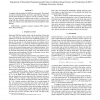Free Online Productivity Tools
i2Speak
i2Symbol
i2OCR
iTex2Img
iWeb2Print
iWeb2Shot
i2Type
iPdf2Split
iPdf2Merge
i2Bopomofo
i2Arabic
i2Style
i2Image
i2PDF
iLatex2Rtf
Sci2ools
ISBI
2007
IEEE
2007
IEEE
Signal and Anatomical Constraints in Adaptive Filtering of Fmri Data
An adaptive filtering method for fMRI data is presented. The method is related to bilateral filtering, but with a range filter that takes into account local similarities in signal as well as in anatomy. Performance is demonstrated on simulated and real data. It is shown that using both these similarity constraints give better performance than if only one of them is used, and clearly better than standard low-pass filtering.
Related Content
| Added | 03 Jun 2010 |
| Updated | 03 Jun 2010 |
| Type | Conference |
| Year | 2007 |
| Where | ISBI |
| Authors | Magnus Borga, Joakim Rydell |
Comments (0)

